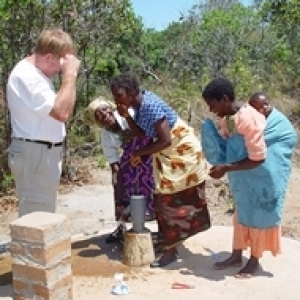Girls, Girls, Girls
23rd September 2017:
This is part of the new group of almost 250 girls we will support this year, up from 187 last year.
We grow carrots on the farm and are trying to introduce them into the diet.
They are not so fond of cooked carrots, but manage OK when eating the raw variety.
In either form carrots are good.
Girls:
In Malawi where we have worked since 2005, a daughter is called the Girl Child.
What brought us back to Malawi 40 times now, was the sight of girls and women carrying dirty water long distances on their heads, all day, every day. Slaves for life! Up to now we have enabled maybe 650,000 people to access clean, safe, drinking water. Water brings us to many remote and inaccessible places, but also gives us the chance to meet some of the most amazing women imaginable. So now we work mainly with women’s Self Help and other Community Based Organisations and groups. They tell us their dreams and we support them with their plans: for preschools, adult education, nutrition, and more recently, education for girls
These women and girls are born into poverty, have no rights, but have a myriad of responsibilities, even as girls. They carry water on their heads when they are as young as four or five, they collect firewood, they are responsible for the growing and cooking of food, and life is hard. When girls are doing those chores they are not going to school. Further challenges for girls include: traditional cultural practices, trafficking, early marriage, and childbirth complications. Males are fed first, preferentially educated, and have any of the rights that exist.
Coming from farms in the West of Ireland I suppose we absorbed from our parents, none of whom who had been to Secondary School, the value and absolute necessity of education as a way out of the poverty of 1940’s Ireland. As with most of what we do in Malawi we draw from the communities and culture that formed us, and are transplanting these values in remote fields 10,000 km from Mayo and Roscommon, but out of necessity we are biased in favour of girls. They have an old saying in Malawi:
Educate a boy and you educate one person
Educate a girl and you educate a family, a village and the Nation.
The say it, and its true, but maybe it stops there
Educated girls have fewer children, are better able to care for them, demand better access to health care and information, have better access to jobs, and are much more likely to send their children to school.
“One child, one teacher, one pen and one book can change the world. Education is the only solution. Education first.”
Malala Yousafzi (Pakistani schoolgirl shot by the Taliban and 2014 Nobel Peace Prize
co-recipient, in her 2013 address to the United Nations).
Over the past four years we have expanded a programme enabling girls who have qualified for Government Secondary Schools, to take up their places. This Year we have 189 girls, none of whom would be there without the support of our caring donors. We observe that every day a girl spends in school her life. This Year we expect to have about 250 girls to care for.
All will need fees; most will need books, stationary, uniforms; Most will need clothes, shoes and most especially underwear, especially knickers. This causes many to miss school, unbelievable in our world of frilly and expensive undies where our girls just need something to cover their bums.
Besides water, preschools, sustainable farming, forestry, education the Girl Child is now a vital part of what we do. We have just finished a four week Summer School continuing the work we do on Saturdays, but bringing a little fun and games, into their, generally sad lives, but also a new module on growing food. Many will settle to go back to remote villages and if and when they do we want them to be able to feed themselves and their families.
After all this I have an ASK.
Our Girls need KNICKERS (or whatever nicer name you use), for the new term, because many have none and regularly stay away from school as a result. Huge stigma attached
Can you help?. Any Colour, plain, for 14 to 20 year olds with larger Malawian Bums
AND EVEN A BIGGER ASK
Now that our women employees feel free to talk about everything to me, I realize that none of our 250 girls will have sanitary pads. REUSABLE/WASHABLE of course. The culture will allow no other solution
If we could get the toweling materials etc, we could set up small sowing clubs with sowing machines to make them. Sheer delight for girls, and maybe a little business for poor village women. And yet another chance to join a few more dots for us
ANY IDEAS, help, exposure, or even expressions of sympathy would be wonderful, because most women, here, are shocked and say to me WE HAD NO IDEA. Maybe YOU can help
- 1
- 1
- Nikon COOLPIX AW130
- 1/1429
- f/2.8
- 4mm
- 125

Comments
Sign in or get an account to comment.


